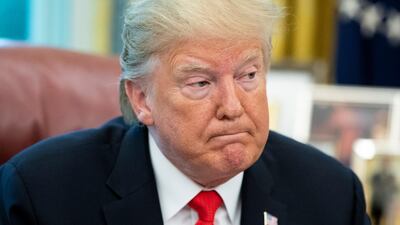President Donald Trump called off a secret Camp David meeting on Sunday with Taliban and Afghanistan leaders and suspended peace talks with the Afghan insurgents in response to an attack that killed an American soldier last week.
Mr Trump announced his decision in a series of tweets on Saturday, scuttling what had appeared to be an imminent peace agreement between the US and the Taliban after months of talks.
The US president said he acted after the Taliban admitted to carrying out the car bombing in Kabul on Thursday that killed 12 people including the soldier, asking who "would kill so many in order to seemingly strengthen their bargaining position" in the negotiations.
He added that if the Taliban would not agree to a cease-fire during the negotiations, "they probably don't have the power" to negotiate a peace deal.
The Taliban had stepped up attacks recently despite Mr Trump's special envoy for Afghanistan, Zalmay Khalilzad, signalling that the US and the insurgents were close to a deal to end 18 years of war. He said last week that a draft agreement had been reached "in principle" which only needed Mr Trump's approval.
Afghan President Ashraf Ghani welcomed Mr Trump's decision to end the talks.
“The government considers the Taliban’s obstinacy to increase violence against Afghans as the main obstacle to the ongoing peace negotiations,” Mr Ghani said in a statement released by his spokesman. “We have consistently stressed that genuine peace is possible when the Taliban stop the killing of Afghans, embrace an inclusive ceasefire, and enter into direct negotiations with the Afghan government.”
The decision was also supported by the UAE.
"President Trump’s decision to cancel his meeting with the Taliban and end the negotiations is right. For how can you negotiate for peace on the one hand, and continue violence and terror on the other?" Minister of State for Foreign Affairs Dr Anwar Gargash said on Twitter. "True and sustainable reconciliation must be built on transparency, clarity and the rejection of extremism and terrorism."
US Secretary of State Mike Pompeo confirmed in a series of television interviews on Sunday that talks with Taliban had been halted "for the time being" and that Mr Khalilzad, who held nine rounds of talks with Taliban over the past year, had been recalled to Washington.
Mr Pompeo said Mr Trump had decided to hold the Camp David meeting to personally see the peace deal to its conclusion.
"President Trump ultimately made the decision," Mr Pompeo said. "He said, 'I want to talk to Ashraf Ghani. I want to talk to these Taliban negotiators. I want to look them in the eye. I want to see if we can get to the final outcome we needed.'"
Many Americans on social media reacted with anger at the news the president was looking to sit down with the Taliban at Camp David on the same week as the 18th anniversary of the 9/11 attacks.
The war in Afghanistan was launched in response to the killing of 2,977 in the September 11, 2001 attacks by Al Qaeda, the leadership of which was based largely in Afghanistan under the protection of the Taliban who were, at the time, in power.
The proposed peace deal would have involved a gradual US troop pullout in exchange for the Taliban reducing violence, guaranteeing not to harbour terror groups, and beginning direct peace talks with the Afghan government.
Mr Khalilzad was in Kabul laying out the terms of the agreement to the government but then returned to Qatar, where the Taliban have a political office, on Thursday evening after the bombing.
President Ghani had planned to travel to Washington on Saturday for talks with Mr Trump but decided to postpone the visit after the bombing.
"Peace with a group that is still killing innocent people is meaningless," Mr Ghani said after the attack.
The Taliban have maintained a high number of deadly attacks to give them a stronger negotiating position in talks with the US and to pressure the government.
The Taliban also kidnapped six Afghan journalists working for private and government media organisations in eastern Paktia province, government officials and Taliban said on Saturday.
The reporters, working for radio and TV news companies that broadcast news in the Pashto and Dari languages, were abducted while travelling together from neighbouring Paktika province to Paktia to attend a media workshop on Friday.
"We are trying to negotiate their release with the Taliban," said Abdullah Hasrat, a spokesman for Paktia's governor.
A Taliban spokesman confirmed the abduction of six journalists by their fighters but said they will be released soon.
"Yes, our mujahideen (fighters) have mistakenly kidnapped them," said Zabihullah Mujahid, a spokesman for the hardline insurgent group.
"Right now mobile services are not working, but they will be released as soon as we establish contact with the local commander," he said.
Afghanistan was the deadliest country in the world to be a journalist in 2018, with 13 deaths according to the Committee to Protect Journalists.
The International Federation of Journalists said 16 journalists were killed last year.
Nine were killed on a single day on April 30.
In June, the Taliban issued a threat to Afghan media, saying journalists will be targeted unless news outlets stop broadcasting what they describe as government propaganda against the insurgents.


